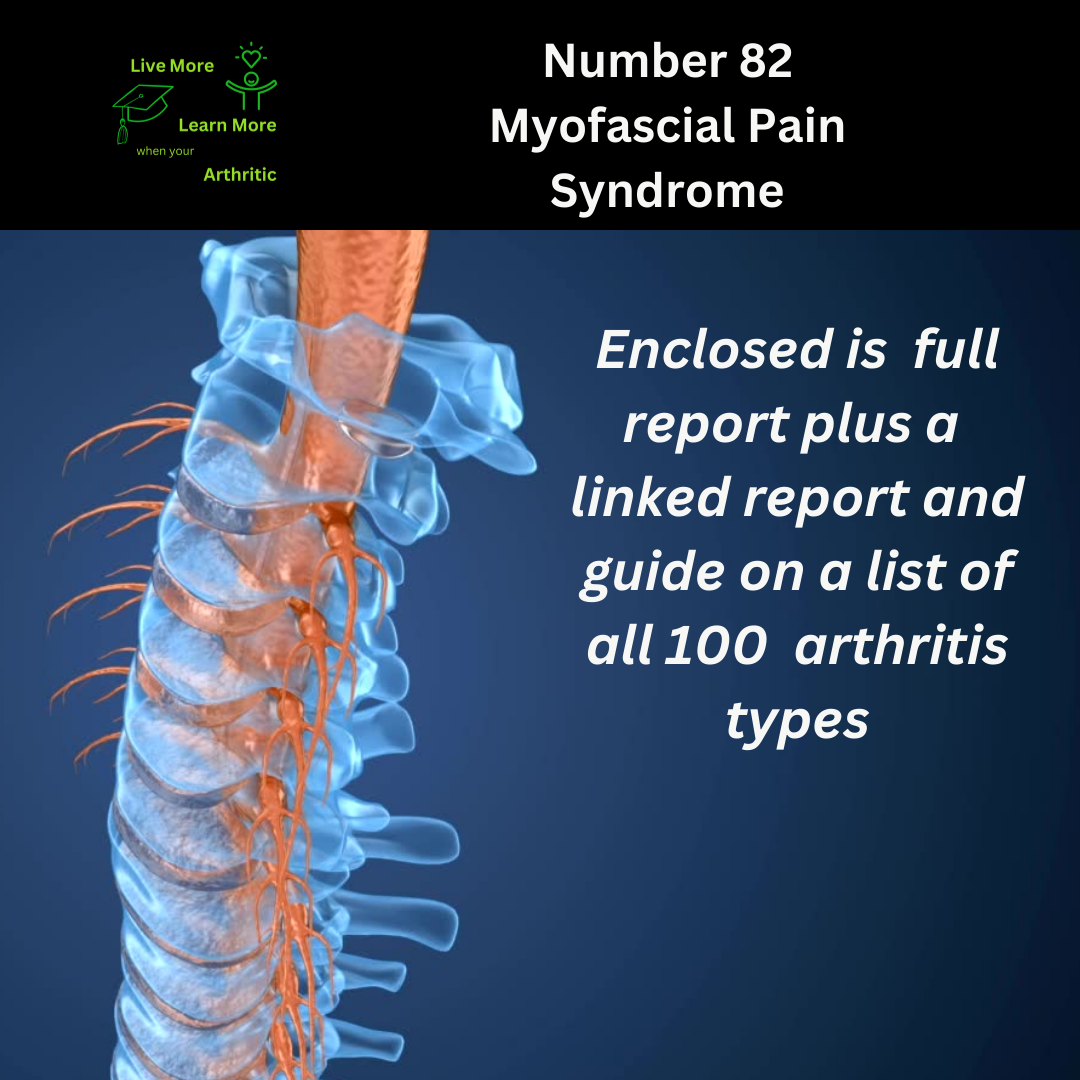
Myofascial Pain Syndrome: Number 82 on the list of 100 types of Arthritis
Unraveling Myofascial Pain Syndrome: Understanding the Complexities of Chronic PainMyofascial Pain Syndrome (MPS) is a chronic pain disorder characterized by localized muscle pain and tenderness. This condition involves the development of trigger points within muscles, which are areas of hyperirritability that can cause referred pain and muscle stiffness. MPS can significantly impact daily life and requires a multifaceted approach to management. Description of the Disease
Description of the Disease
MPS primarily affects the muscles and surrounding connective tissue (fascia). Trigger points, or knots of tense muscle fibers, develop in response to muscle overuse, injury, or stress. These trigger points can cause persistent pain and discomfort, often radiating to other areas of the body. MPS is commonly associated with repetitive motions, poor posture, or muscle imbalances.
Causes and Triggers
The exact cause of MPS is multifactorial and may involve a combination of muscle overuse, trauma, psychological stress, and underlying medical conditions. Factors such as poor ergonomics, prolonged sitting, or repetitive movements can contribute to the development of trigger points and exacerbate symptoms.
Symptoms and Impact on Range of Motion
Symptoms of MPS include localized muscle pain, tenderness, and stiffness. The affected muscles may feel tight or knotted, limiting range of motion and causing discomfort with movement. Trigger points can also refer pain to other areas, leading to a broader pattern of discomfort.
Age of Onset and Prognosis
MPS can develop at any age but is more common in adults, particularly those with sedentary lifestyles or occupations that involve repetitive motions. The prognosis for MPS varies depending on the severity of symptoms and response to treatment. While MPS is not life-threatening, it can significantly impact quality of life if left unmanaged.
Autoimmune Nature of Myofascial Pain Syndrome
Myofascial Pain Syndrome is not considered an autoimmune disorder. It primarily involves muscular and connective tissue abnormalities rather than immune system dysfunction.
Improving Quality of Life through Proactive Measures
A proactive approach to managing MPS involves a combination of lifestyle modifications and therapeutic interventions. Strategies such as regular exercise, stress reduction techniques (e.g., yoga, meditation), ergonomic adjustments, and physical therapy can help reduce muscle tension, improve flexibility, and alleviate pain associated with trigger points.
Possible Complications of Myofascial Pain Syndrome
Complications of MPS may include chronic pain, decreased mobility, and disruption of daily activities. In some cases, untreated trigger points can lead to muscle weakness or altered posture, contributing to further discomfort and functional limitations.
Natural Breakthroughs and Health Advantages
Research into natural approaches for MPS management is ongoing. Some individuals find relief from complementary therapies such as acupuncture, massage therapy, and herbal supplements (e.g., turmeric, ginger) that have anti-inflammatory properties. Adopting a well-balanced diet rich in nutrients and staying hydrated can also support overall muscle health.
 Demographic Patterns and Gender Distribution
Demographic Patterns and Gender Distribution
Myofascial Pain Syndrome affects individuals of all ages and genders. While there is no significant gender bias, certain lifestyle factors or occupations may predispose individuals to develop MPS.
Interconnected Diseases or Conditions
MPS can coexist with other musculoskeletal disorders such as fibromyalgia, chronic fatigue syndrome, or temporomandibular joint disorder (TMJ). These conditions share overlapping symptoms and may require comprehensive evaluation and management to address underlying contributors to chronic pain.
In summary, Myofascial Pain Syndrome represents a complex interplay of muscular dysfunction and pain sensitivity. By adopting a proactive approach to symptom management and integrating lifestyle modifications, individuals with MPS can achieve improved quality of life and regain control over their physical well-being with determination and resilience.

